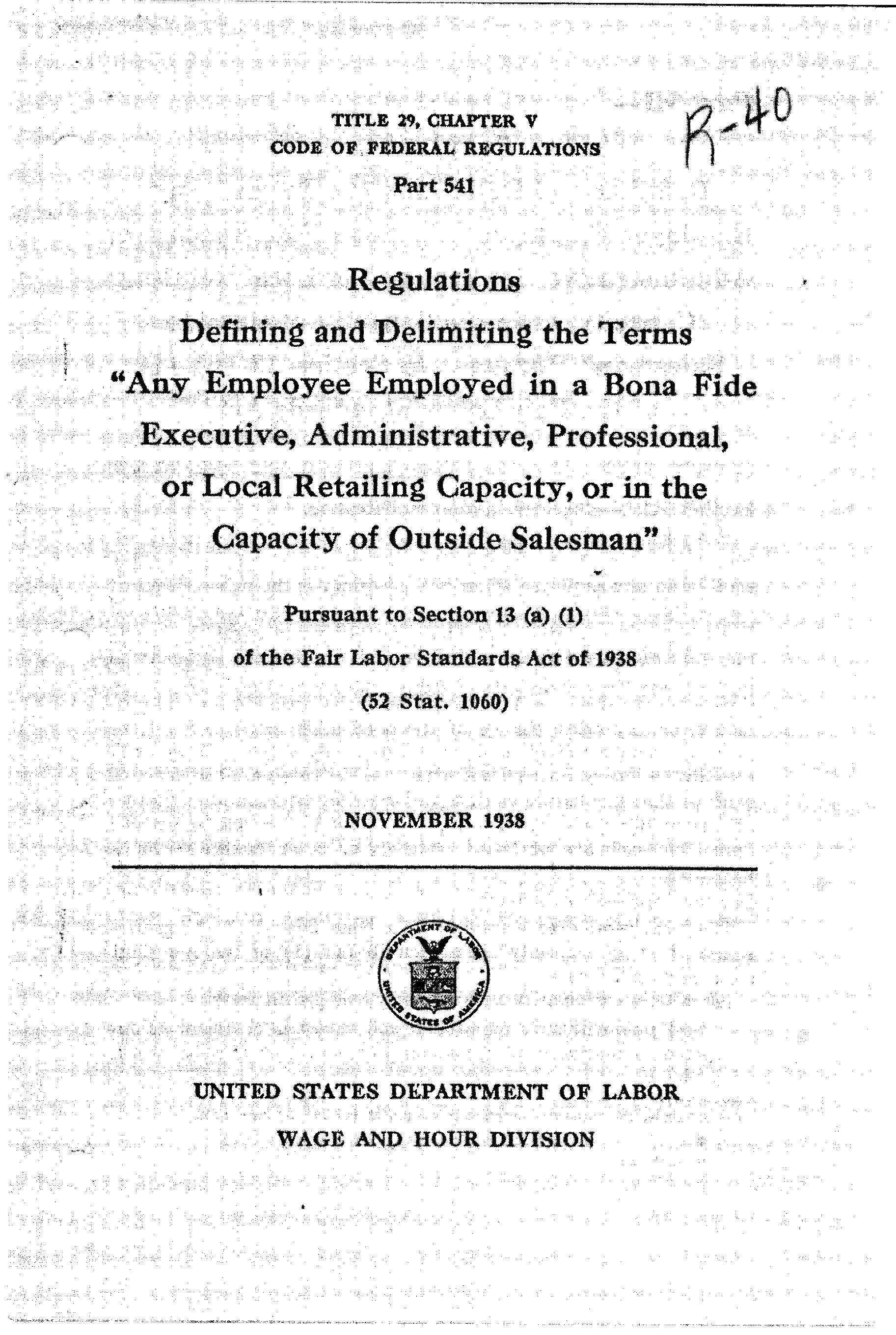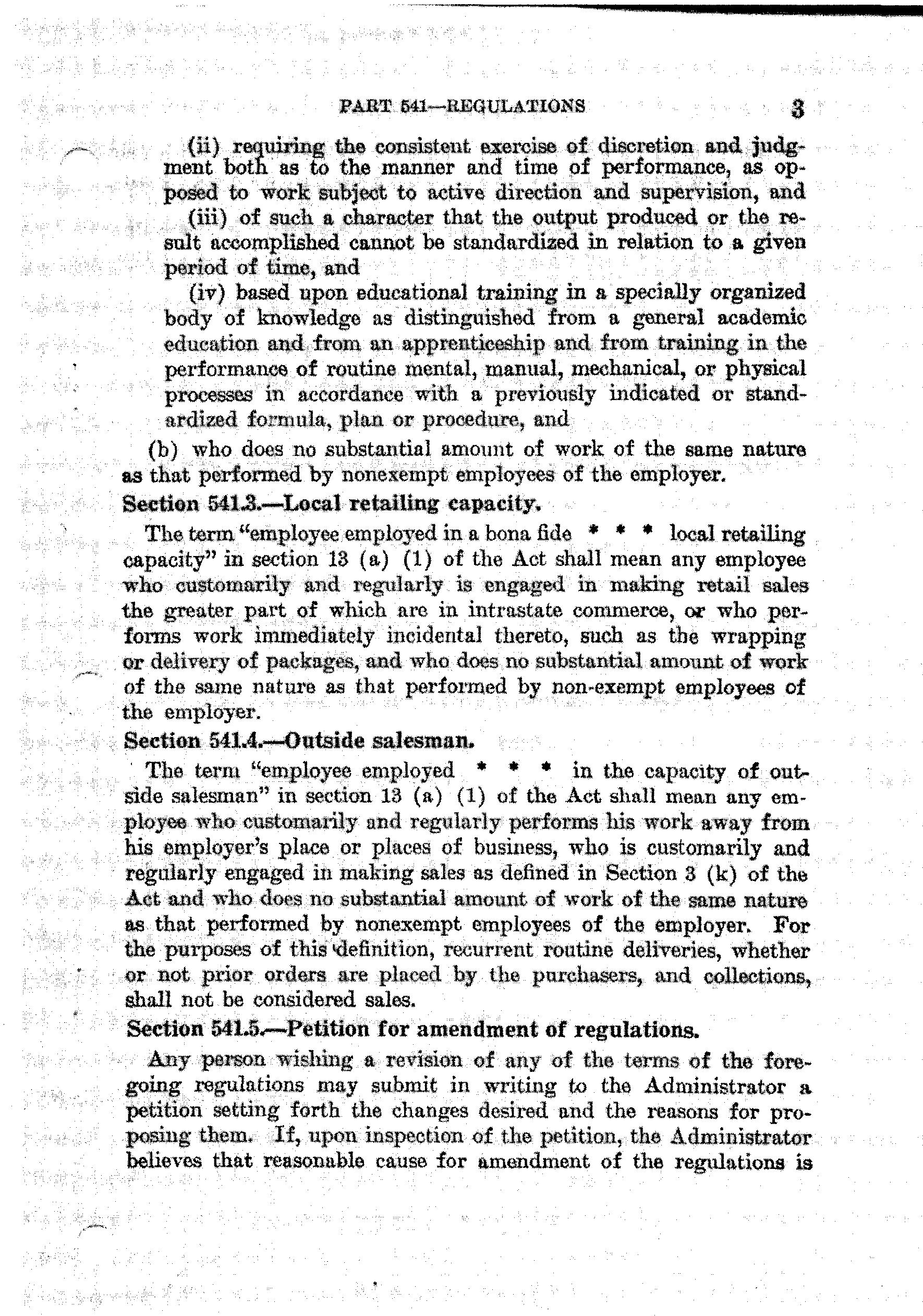
———————————————————————————————————————————————————
———————————————————————————————————————————————————
[PAGE 1]
===========================================================
[PAGE 1]R-40
Regulations
Defining and Delimiting the Terms
"Any Employee Employed in a Bona Fide
Executive, Administrative, Professional,
or Local Retailing Capacity, or in the
Capacity of Outside Salesman"
Pursuant to Section 13 (a) (1)
of the Fair Labor Standards Act of 1938
(52 Stat. 1060)
NOVEMBER 1938
___________________________________
UNITED STATES DEPARTMENT OF LABOR
WAGE AND HOUR DIVISION
[PAGE 1]
===========================================================
[PAGE 2]

[PAGE 2]
===========================================================
[PAGE 2]
Part 541—
Regulations
Defining and Delimiting the Terms "Any
Employee Employed in a Bona Fide Executive,
Administrative, Professional, or Local Retailing
Capacity, or in the Capacity of Outside
Salesman" Pursuant to Section 13 (a) (1)
of the Fair Labor Standards Act1
Section 541.1. —Executive and administrative.
The term "employee employed in a bona fide executive (and) administrative • • * capacity" in section 13 (a) (1) of the Act shall mean any employee whose primary duty is the management of the establishment, or a customarily recognized department thereof, in which he is employed, and who customarily and regularly directs the work of other employees therein, and who has the authority to hire and fire other employees or whose suggestions and recommendations as to the hiring and firing and as to the advancement and promotion or any other change of status of other employees will be given particular weight, and who customarily and regularly exercises discretionary powers, and who does no substantial amount of work of the same nature as that performed by nonexempt employees of the employer, and who is compensated for his services at not less than $30 (exclusive of board, lodging, or other facilities) for a workweek.
Section 541.2. —Professional.
The term "employee employed in a bona fide * * * professional * * * capacity" in section 13 (a) (1) of the Act shall mean any employee—
(a) who is customarily and regularly engaged in work—
(i) predominantly intellectual and varied in character as opposed to routine mental, manual, mechanical or physical work, and
__________
1Issued under the authority contained In section 13 (a) (1), 62 Stat. 1060.
2 107702* -38
[PAGE 2]
===========================================================
[PAGE 3]

[PAGE 3]
===========================================================
[PAGE 3]
PART 541—REGULATIONS
(ii) requiring the consistent exercise of discretion and judgment both as to the manner and time of performance, as opposed to work subject to active direction and supervision, and
(iii) of such a character that the output produced or the result accomplished cannot be standardized in relation to a given period of time, and
iv) based upon educational training in a specially organized body of knowledge as distinguished from a general academic education and from an apprenticeship and from training in the performance of routine mental, manual, mechanical, or physical processes in accordance with a previously indicated or standardized formula, plan or procedure, and
(b) who does no substantial amount of work of the same nature as that performed by nonexempt employees of the employer.
Section 541.3.—Local retailing capacity.
The term "employee employed in a bona fide * * • local retailing capacity" in section 13 (a) (1) of the Act shall mean any employee who customarily and regularly is engaged in making retail sales the greater part of which are in intrastate commerce, or who performs work immediately incidental thereto, such as the wrapping or delivery of packages, and who does no substantial amount of work of the same nature as that performed by non-exempt employees of the employer.
Section 541.4.—Outside salesman.
The term "employee employed * * * in the capacity of outside salesman" in section 13 (a) (1) of the Act shall mean any employee who customarily and regularly performs his work away from his employer's place or places of business, who is customarily and regularly engaged in making sales as defined in Section 3 (k) of the Act and who does no substantial amount of work of the same nature as that performed by nonexempt employees of the employer. For the purposes of this 'definition, recurrent routine deliveries, whether or not prior orders are placed by the purchasers, and collections, shall not be considered sales.
Section 541.5.—Petition for amendment of regulations.
Any person wishing a revision of any of the terms of the foregoing regulations may submit in writing to the Administrator a petition setting forth the changes desired and the reasons for proposing them. If, upon inspection of the petition, the Administrator believes that reasonable cause for amendment of the regulations is
[PAGE 3]
===========================================================
[PAGE 4]

[PAGE 4]
===========================================================
[PAGE 4]
set forth, the Administrator will either schedule a hearing with due notice to interested parties, or will make other provision for affording interested parties an opportunity to present their views, either in support of or in opposition to the proposed changes. In determining such future regulations, separate treatment for different industriea and for different classes of employees may be given consideration.
_______________
Approved by the Administrator, October 19, 1938.
Published in the Federal Register, October 20, 1938
U. S. GOVERNMENT PRINTING OFFICE : 1938
________________________________________
For sale by the Superintendent of Documents, Washington, D. C. - - - - Price 5 cents
[PAGE 4]